

Our research into job satisfaction. This page outlines our research into job satisfaction.
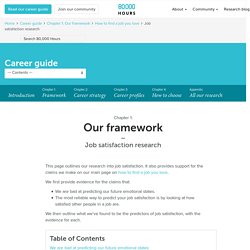
It also provides support for the claims we make on our main page on how to find a job you love. We first provide evidence for the claims that: We are bad at predicting our future emotional states. The most reliable way to predict your job satisfaction is by looking at how satisfied other people in a job are. We then outline what we’ve found to be the predictors of job satisfaction, with the evidence for each. We are bad at predicting our future emotional states One example of this related to career choice is the relationship between income and life satisfaction. One implication of this research is that we should be more sceptical of our existing prior beliefs about what will make us happy than we are in other domains. We’ve previously written about our failures to predict how we will feel here. 5 Steps to Find a Career You Actually Love (Like I Did)
I’ll never forget that night.
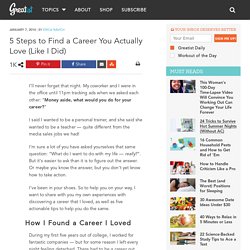
My coworker and I were in the office until 11pm tracking ads when we asked each other: “Money aside, what would you do for your career?” How to find a job you'll love. Is your new years resolution to find a new job?
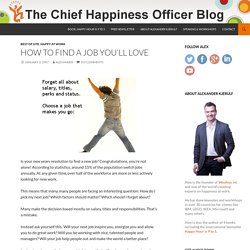
Congratulations, you’re not alone! According to statistics, around 15% of the population switch jobs annually. At any given time, over half of the workforce are more or less actively looking for new work. This means that many, many people are facing an interesting question: How do I pick my next job? Which factors should matter? Many make the decision based mostly on salary, titles and responsibilities. 10 Enlightening Questions to Pick a Career You’ll Truly Enjoy. Choosing a career path can be a confusing, complicated and—at worst—depressing experience.
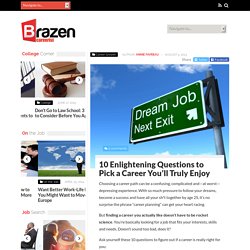
With so much pressure to follow your dreams, become a success and have all your sh*t together by age 25, it’s no surprise the phrase “career planning” can get your heart racing. How to Pick a Career You Actually Like. Happiness. Ah, happiness, that elusive state.
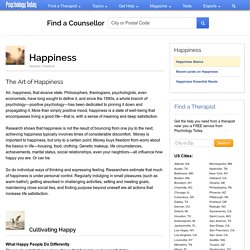
Philosophers, theologians, psychologists, even economists, have long sought to define it, and since the 1990s, a whole branch of psychology—positive psychology—has been dedicated to pinning it down and propagating it. More than simply positive mood, happiness is a state of well-being that encompasses living a good life—that is, with a sense of meaning and deep satisfaction. Research shows that happiness is not the result of bouncing from one joy to the next; achieving happiness typically involves times of considerable discomfort. Money is important to happiness, but only to a certain point. Money buys freedom from worry about the basics in life—housing, food, clothing. So do individual ways of thinking and expressing feeling. 5 Questions to Discover Who You Are and What Will Make You Happy.
“It takes courage to grow up and become who you really are.”
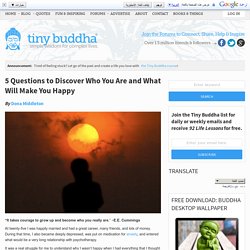
~E.E. Cummings At twenty-five I was happily married and had a great career, many friends, and lots of money. The Epicurean Problem with YOLO: Short Term vs. Long Term Happiness. You’re 16 years old, your hormones are raging, and you’re finally making out with that hot girl from 4th period, hoping to push things to the next level.

The last thing on your mind is the possible long-term consequences of that next level. Instead of pausing to think about sexually transmitted infections or the responsibilities of parenthood, all you can focus on is what comes next. Right now is all that seems to matter. Or, the way it’s being expressed lately: YOLO – you only live once. One of the problems that always gets brought up in discussions I find myself having about happiness is that there are different types of happiness that essentially compete with one another.
On the surface, this seems like a difficult dilemma: if our life is only made up of individual moments, then how could we possibly be happier in the long run by choosing to avoid those things that make us happy in a particular moment? So what’s the problem? Epicureanism is a particular form of hedonism. Why Aren’t We Good At Predicting What Will Make Us Happy? “To be, rather than to seem.”
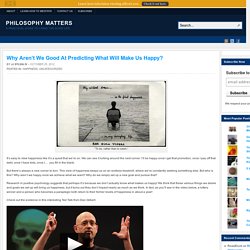
It’s easy to view happiness like it’s a quest that we’re on. We can see it lurking around the next corner: I’ll be happy once I get that promotion, once I pay off that debt, once I have kids, once I… you fill in the blank. But there’s always a new corner to turn. This view of happiness keeps us on an endless treadmill, where we’re constantly seeking something else. Finding the Right Career: Choosing or Changing Jobs and Finding Satisfaction at Work. How to Find a Career You’ll Truly Love. 8 Jobs You'll Love That Pay $50,000 a Year. HOW TO FIND A JOB YOU LOVE. We all know what the perfect job is.
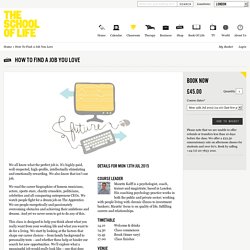
It's highly-paid, well-respected, high-profile, intellectually stimulating and emotionally rewarding. We also know that isn't our job. We read the career biographies of famous musicians, actors, sports stars, charity crusaders, politicians, celebrities and all-conquering entrepreneur CEOs. We watch people fight for a dream job on The Apprentice. We see people energetically and passionately overcoming obstacles and achieving their ambitions and dreams. 5 Tips for Finding a Job You Love. An avid environmentalist would never be happy at a company that doesn't even recycle its printer paper.
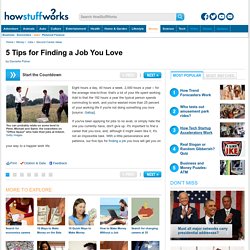
And, a very ambitious person would never want to work for a business that doesn't recognize its employees for their accomplishments. Why You Can't Find A Job You Love. Welcome to Forbes. We Have No Idea What Makes Us Happy. THE SCIENCE OF HAPPINESS. (DANIEL GILBERT:) When people think of "science," they naturally think of atoms, planets, robots — things they can touch and see. They know that subjective experiences such as happiness are important, but they believe that such experiences can't be studied scientifically. That belief is dead wrong. What does it take to study something scientifically? One word: Measurement. If you can measure something, you can study it scientifically. But just to be consistent, you should also discard your glasses or contact lenses, because optometry is another one of those sciences that is built entirely on people's reports of subjective experience.
On the basis of your answers, the optometrist is able to create a lens that corrects your vision quite precisely. People often bristle at the suggestion that human behavior is merely an attempt to attain happiness. The second argument is also wrong. This sounds like a semantic abstraction, and it isn't. We're all told that variety is the spice of life.